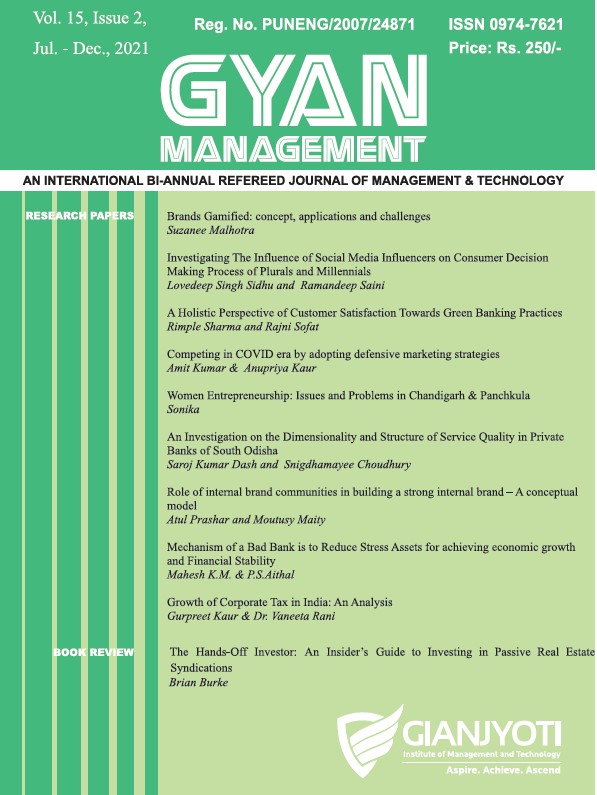Geopolitics of Renewable Energy: Shaping the Global Power Landscape
DOI:
https://doi.org/10.48165/gmj.2022.17.2.9Keywords:
Geopolitics, Renewable Energy, Global Power Landscape, Fossil Fuels, Climate Change, Energy SecurityAbstract
This research paper provides a comprehensive analysis of the geopolitical implications of the global transition towards renewable energy. It scrutinizes the traditional energy landscape, emphasizing how fossil fuel resources have historically shaped geopolitical power structures. The key drivers of the shift towards renewables, such as climate change, economic viability, and energy security, are elaborated. The paper identifies emerging leaders in the renewable sector, namely, China and the European Union, and discusses how their strategic positioning could reshape global power dynamics. It examines the potential challenges associated with this energy transition and strategies to mitigate these challenges, emphasizing the role of international cooperation. The paper concludes that the renewable energy revolution marks a significant shift in global geopolitics. This research underscores the deep interconnection between energy and power, emphasizing its enduring relevance in this renewable future.
Downloads
References
Arndt, C., Arent, D., Hartley, F., Merven, B., & Mondal, A. H. (2019). Faster than you think: Renewable energy and developing countries. Annual Review of Resource Economics, 11, 149-168.
Blondeel, M., Bradshaw, M. J., Bridge, G., & Kuzemko, C. (2021). The geopolitics of energy system trans formation: A review. Geography Compass, 15(7), e12580.
Dr. Ashima Mangla Year 2023, Volume-17, Issue-2 (July-December)
Criekemans, D. (2011, March). The geopolitics of renewable energy: different or similar to the geo politics of conventional energy. In ISA annual con vention (pp. 16-19). Canada Montreal.
Criekemans, D. (2018). Geopolitics of the renewable energy game and its potential impact upon global power relations (pp. 37-73). Springer International Publishing.
Ghosh, S. (2022). Renewable energy and CO2 emis sions: the economics and geopolitical implications, experiences from the BRICS nations. International Journal of Energy Sector Management.
Henderson, J., & Sen, A. (2021). The Energy Transition: Key challenges for incumbent and new players in the global energy system (No. 01). OIES Paper: ET.
O’Sullivan, M., Overland, I., & Sandalow, D. (2017). The geopolitics of renewable energy.
Overland, I. (2019). The geopolitics of renewable energy: Debunking four emerging myths. Energy Research & Social Science, 49, 36-40
Overland, I., Juraev, J., & Vakulchuk, R. (2022). Are renewable energy sources more evenly distributed than fossil fuels?. Renewable Energy, 200, 379-386.
Paravantis, J. A., & Kontoulis, N. (2020). Energy secu rity and renewable energy: a geopolitical perspec tive. In Renewable Energy-Resources, Challenges and Applications. IntechOpen.
Pradhan, R. (2020). Geopolitics of Energy in Central Asia: India’s Position and Policy. Taylor & Francis. Scholten, D., & Bosman, R. (2016). The geopolitics of renewables; exploring the political implica tions of renewable energy systems. Technological Forecasting and Social Change, 103, 273-283. Scholten, D., Bazilian, M., Overland, I., & Westphal, K. (2020). The geopolitics of renewables: New board, new game. Energy Policy, 138, 111059.
Vakulchuk, R., Overland, I., & Scholten, D. (2020). Renewable energy and geopolitics: A review. Renewable and sustainable energy reviews, 122, 109547.
Downloads
Published
Issue
Section
License
Copyright (c) 2023 Gyan Management Journal

This work is licensed under a Creative Commons Attribution 4.0 International License.



